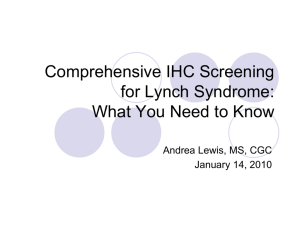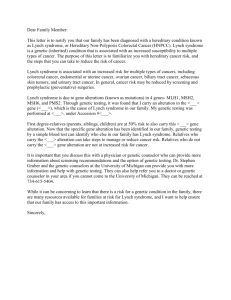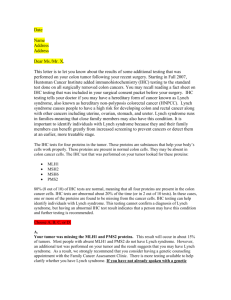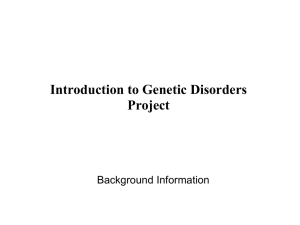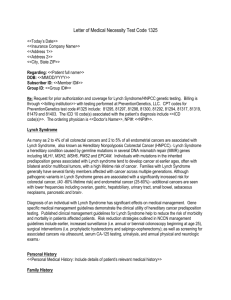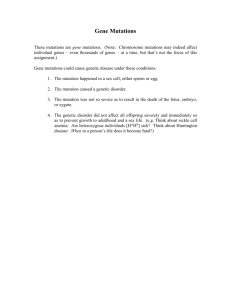MLH1 and PMS2 - Lynch Syndrome Screening Network
advertisement
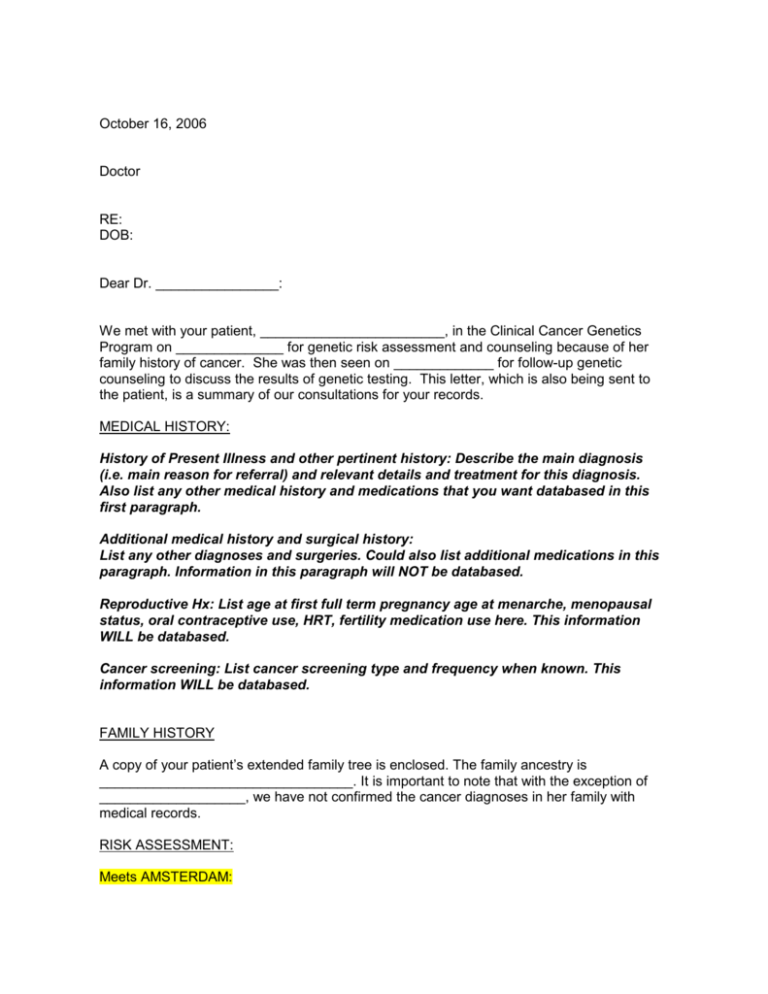
October 16, 2006 Doctor RE: DOB: Dear Dr. ________________: We met with your patient, ________________________, in the Clinical Cancer Genetics Program on ______________ for genetic risk assessment and counseling because of her family history of cancer. She was then seen on _____________ for follow-up genetic counseling to discuss the results of genetic testing. This letter, which is also being sent to the patient, is a summary of our consultations for your records. MEDICAL HISTORY: History of Present Illness and other pertinent history: Describe the main diagnosis (i.e. main reason for referral) and relevant details and treatment for this diagnosis. Also list any other medical history and medications that you want databased in this first paragraph. Additional medical history and surgical history: List any other diagnoses and surgeries. Could also list additional medications in this paragraph. Information in this paragraph will NOT be databased. Reproductive Hx: List age at first full term pregnancy age at menarche, menopausal status, oral contraceptive use, HRT, fertility medication use here. This information WILL be databased. Cancer screening: List cancer screening type and frequency when known. This information WILL be databased. FAMILY HISTORY A copy of your patient’s extended family tree is enclosed. The family ancestry is _________________________________. It is important to note that with the exception of ___________________, we have not confirmed the cancer diagnoses in her family with medical records. RISK ASSESSMENT: Meets AMSTERDAM: The family history of early onset colorectal cancer, endometrial cancer and ovarian cancer meet the Amsterdam criteria for a clinical diagnosis of Lynch syndrome (formerly referred to as Hereditary Nonpolyposis Colorectal Cancer, HNPCC). Doesn’t meet Amsterdam: Based upon the information your patient provided, the family history is suggestive of, but does not meet the clinical criteria for a diagnosis of Lynch syndrome. Bethesda: However, the patient’s family history does meet the Bethesda criteria for performing microsatellite instability and immunohistochemistry analyses. We utilized several risk assessment models and laboratory data to calculate the chance the family has a mutation in a cancer susceptibility gene. Because each model is different, there can be a lot of variability in the risks they give. Therefore, these numbers must be considered a rough range and not a precise risk of having a mutation in a Lynch syndrome gene. Estimated Risk of Having a Lynch Syndrome Gene Mutation: Purpose of model Model Name Risk Assessment Likelihood of mutation PREMM1,2 Likelihood of mutation MMRpredict Likelihood of mutation MMRPro Family risk = Patient risk = Family risk = Patient risk = Family risk = Patient risk = Accuracy of model for this patient Therefore, we discussed performing microsatellite instability testing and immunohistochemistry for the four proteins most commonly associated with Lynch syndrome on __________________. TEST RESULTS: MSI Test Results Microsatellite instability (MSI) is a characteristic marker of DNA instability that is much more common in tumors from individuals with Lynch syndrome than in individuals who do not have this condition. Studies have shown that 95% of colon cancers from individuals with Lynch syndrome show MSI whereas only 15% of all colon cancers show MSI. Your patient’s colon tumor was found to be microsatellite stable, making it less likely that s/he has Lynch syndrome. OR was found to show microsatellite instability, supporting a diagnosis of Lynch syndrome. OR The laboratory was unable to perform the MSI test on your patient’s tumor because there was not enough normal tissue in the block they received. Immunohistochemistry Results Immunohistochemical staining for the four mismatch repair proteins, MLH1, MSH2, MSH6 and PMS2 demonstrated loss of MLH1 and PMS2 expression. Since these proteins work in pairs, generally staining is lost for both when either has a mutation. These results indicate loss of normal DNA mismatch repair function within the tumor due to defective MLH1 and PMS2. MLH1 AND PMS2 LOSS: There are two possible explanations for why the IHC assay could show absence of the MLH1 gene product, such as in this case. 1. Twenty percent of patients with this IHC result have Lynch syndrome due to an inherited mutation in the MLH1 gene. 2. Eighty percent of patients with this IHC result have acquired methylation of the MLH1 gene promoter in their colon which led to the development of cancer. This is usually not inherited. Choose one: Therefore, we recommended performing MLH1 promoter methylation testing on the tumor. In combination with the methylation test, the laboratory also performs BRAF gene mutation testing on the tumor sample since BRAF mutations have never been seen in a patient with Lynch syndrome. If the tumor does not have MLH1 promoter methylation or a BRAF mutation, it makes a diagnosis of Lynch syndrome more likely. OR Therefore, we recommended performing MLH1 gene testing for this patient. BRAF and MLH1 promoter test results Your patient’s tumor was positive for both MLH1 promoter methylation and the BRAF V600E mutation. This result suggests that your patient does NOT have Lynch syndrome. This is supported by his/her late age at diagnosis as well as his/her negative family history. Based on these results, we do not consider your patient to be at increased risk for other Lynch syndromeassociated cancers. His/Her children have a mildly elevated colon cancer risk given that they have one close relative with colon cancer. MLH1 gene testing results (NEGATIVE) Your patient does not have a detectable mutation in MLH1 using sequencing or Southern blot analysis. This result rules out the majority of mutations in MLH1. However, there are other uncommon mutations in this gene that this test will not detect, as well as other Lynch syndrome genes that were not analyzed. The technology utilized in this analysis was designed to sequence all translated exons and immediately adjacent intronic regions, as well as detect large rearrangements in MLH1. Your patient did not have PMS2 gene testing because PMS2 gene testing is not available clinically. Therefore, it is still possible, although unlikely, that your patient has a PMS2 mutation that has not been detected. MLH1 PMS2 gene testing result POSITIVE Based upon your patient’s personal and family history, she underwent genetic testing for Lynch syndrome. Genetic testing for mutations in MLH1 PMS2 indicate that your patient has the __________ mutation identified in the ________ gene. MLH1 RESULTS: This result confirms that your patient has Lynch syndrome (formerly known as Hereditary Nonpolyposis Colorectal Cancer, HNPCC) and is at increased risk for developing the cancers associated with Lynch syndrome. Men and women with MLH1 mutations have a 4080% risk for developing colon cancer by age 70. Colon cancers occurring in Lynch syndrome tend to occur in the proximal colon (on the right side near the junction with the small intestine) and affected individuals have a higher chance of developing a second primary colon cancer than an individual who does not have Lynch syndrome. In MLH1 mutation carriers, this risk is 30% within ten years after the original surgery, and 50% within 15 years. The risk to develop endometrial cancer by age 70 is 30-60% in women with an MLH1 mutation compared to 2-3% in the general population. Women with MLH1 mutations also have a 12-24% lifetime risk of developing ovarian cancer. Stomach cancer is the fourth most common type of cancer associated with Lynch syndrome, affecting about less than or equal to 13% of individuals with MLH1 mutations. Individuals with a MLH1 mutations also have slightly increased risks (under 4% to age 70) for developing cancers of the small intestine, bile duct system, pancreas and brain, and transitional cell carcinoma of the renal pelvis (kidney) or ureter. PMS2 Results: This result confirms that your patient has Lynch syndrome (formerly known as Hereditary Nonpolyposis Colorectal Cancer, HNPCC) and is at increased risk for developing the cancers associated with Lynch syndrome. The cancer risks in Lynch syndrome patients with PMS2 mutations have been found to differ somewhat from Lynch syndrome patients with mutations in the other genes. Men and women with PMS2 mutations have a 15-20% risk for developing colon cancer by age 70. Colon cancers occurring in Lynch syndrome tend to occur in the proximal colon (on the right side near the junction with the small intestine) and affected individuals have a higher chance of developing a second primary colon cancer than an individual who does not have Lynch syndrome. The risk to develop endometrial cancer by age 70 is around 15% in women with a PMS2 mutation compared to 2-3% in the general population. Women with PMS2 mutations also have a 6% lifetime risk of developing ovarian cancer. Stomach cancer is the fourth most common type of cancer associated with Lynch syndrome, affecting about approximately 6% of individuals with PMS2 mutations. Individuals with a PMS2 mutation also have slightly increased risks (under 3% to age 70) for developing cancers of the small intestine, bile duct system, pancreas and brain, and transitional cell carcinoma of the renal pelvis (kidney) or ureter. Each of your patient’s first-degree relatives has a one in two (50%) chance of having this mutation. Therefore, we strongly recommended that your patient notify her family members of their risk and the option of genetic counseling and testing. RECOMMENDATION AND PLAN 1. Testing decision and recommendation if applicable 2. We recommend the following risk reducing strategies based on the patient’s risk level. We encouraged her to discuss these recommendations with you and her other health care providers in more detail. HIGH RISK Given the family history we recommend the patient and their family follow Lynch syndrome screening guidelines. a. Colonoscopy every 1-2 years starting at age 20-25 (age 30 in families with MSH6 or PMS2 gene mutations) or 2-5 years prior to youngest age at which colon cancer was diagnosed in the family if it was under age 25. b. There is new data showing that daily use of 600mg of aspirin for at least 2 years lowers the risk for colon cancer by almost 60% in individuals with Lynch syndrome. Since aspirin is available in 325mg tablets in the U.S., we recommend that our patients with Lynch syndrome consider daily use of 650mg (two adult dose tablets) of aspirin under the direction of their family physician as long as they do not have any contraindication (stomach ulcers, bleeding disorders, etc.). c. Consider surgery to remove the uterus, ovaries and fallopian tubes to reduce the chance of developing uterine and ovarian cancer after childbearing. d. There is no clear evidence to support endometrial cancer or ovarian cancer screening, but some clinicians recommend annual uterine (endometrial) biopsy, transvaginal ultrasound and CA-125 blood test, all beginning at age 30. e. We recommend consideration of screening for stomach and small bowel cancers every 1-2 years starting at age 30-35, if these cancers have occurred in the family. Please note that screening for stomach and small bowel cancer is controversial because there is no clear data as to what is most effective. Some groups recommend consideration of upper endoscopy (including side-viewing exam) starting at age 3035, repeating every 2-3 years depending on findings. Other groups do not recommend screening for stomach and small bowel cancer at all, while others only recommend it if stomach/small bowel cancer appears in the family. We recommend consideration of urinalysis with cytology every 1 – 2 years beginning at age 40-45 years. Screening for urothelial (renal pelvis, ureter and bladder) cancer is controversial because there is no clear data as to what is most effective. Some groups recommend consideration of urinalysis with cytology every 1-2 years either beginning at age 25-35 or age 40-45. g. Annual physical examination to screen for symptoms of other cancers. LOW RISK a. Colonoscopy beginning at age ___ (which is 10 years younger than the earliest age of diagnosis in the family) b. Follow American Cancer Society guidelines for other cancer surveillance f. 3. We provided your patient with a fact sheet summarizing information about Lynch syndrome. We hope this information is helpful to you in the care of your patient. Please feel free to contact us with any questions or concerns. We can be reached at (614) 293-6694. Sincerely, Certified Genetic Counselor Judith A. Westman, M.D., FAAP, FACMG Clinical Geneticist Professor, Internal Medicine Certified Genetic Counselor Doreen M. Agnese, MD, FACS Assistant Professor Surgical Oncology/Clinical Cancer Genetics cc: Doctors Patient
